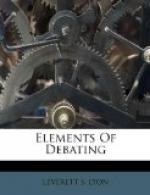In order that the jury may decide as fairly as possible what evidence is sound and what is not, the attorneys on each side of the case make out a copy of what are called instructions. These are given to the judge who, provided he approves of them, reads them to the jury. Usually these instructions urge the jurors to consider four things. They must consider, first, whether or not the statements of the witness are probable; that is, are they consistent with human experience? Do they seem reasonable and natural? A second thing which the jury is told to bear in mind is the opportunity which the witness had of observing the facts of which he speaks. Was he in a position to be familiar with the thing he describes? In this connection, the jury is sometimes instructed to consider the physical and mental qualities of the witness. Is he a man who is physically and mentally able to judge what he observes under such circumstances? A third factor which the jury must consider is the possibility of prejudice on the part of the witness. Has he any reason to feel more favorably toward one side than toward the other? Is the defendant his friend or relative or employer? A final consideration is what is commonly called “interest in the case.” It is clear that if the witness will be benefited by a certain verdict, he may be inclined to frame his evidence in such a way that it will tend toward that verdict. All these considerations are based on the rule of referring to experience. What a judge really says in a charge to the jury is this: “Does your experience warn you that the testimony of some of these witnesses is unsound? Determine upon that basis in what respects these witnesses have told the whole truth and in what respects they have not.”
To summarize: The issues of a proposition are proved by being supported with evidence. Since evidence is the material with which we build the connection between the issues and the experience of the audience, that evidence will be best which will receive the quickest and strongest support from the experience of the hearers.[3]
SUGGESTED EXERCISES
1. In the following extract from a speech of Burke, the famous debater has asserted that it is undesirable to use force upon the American colonies. State the four main reasons why he thinks so. Under each principal reason, put the reasons or evidence with which it is supported. Is this evidence convincing? Why, or why not?
First, Sir, permit me to observe that the use of force alone is but temporary. It may subdue for a moment, but it does not remove the necessity of subduing again; and a nation is not governed which is perpetually to be conquered.
My next objection is its uncertainty. Terror is not always the effect of force, and an armament is not a victory. If you do not succeed, you are without resource; for, conciliation failing,




